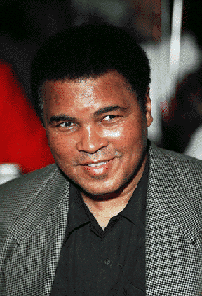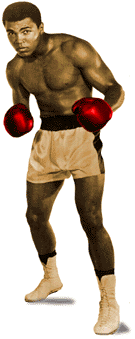































|

|

|

|

|

|

|

|

|

|

|

|

|

|

|

|

|

|

|

|

|

|

|

|

|

|

|

|

|

|

|
|
|
|

|
|
|
MUHAMMAD ALI |
|


|
|
|
Muhamed Ali is without any doubt, the Greatest Boxer that ever lived. His exploits inside the ring stand out to this day, decades after his retirement from the sport. The reason for this is that Ali was not just a Great Boxer, but a true Champion, both inside and outside the ring. There is more to the man than just the knockouts he gladly handed his opponents. He stood for something bigger than the sport, something very rare in our current crop of professional athletes. Ali used his fame and fortune to focus the world's attention on social and humanitarian issues. First and foremost he converted to Islam and dropped his Christian name Cassius Clay. He said this was a slave name given to his ancestors by their slave masters. He also wanted nothing to do with their religion(Christianity) which he believed was used to perpetuate slavery and other injustices against the black people. This trend has grown tremendously among African-Americans, but very few of them realize that it was Muhamed Ali who popularized it. One of his major career fights dubbed Rumble in the Jungle, against George Foreman, was held in Zaire, a country deep in the heart of Africa. This was Ali's way of both giving back to his African ancestry and highlighting the plight of the African continent. Then there was the Vietnam incident, where he refused to be drafted into the American army to fight the Communist Vietnamese. His famous or infamous remark, I aint got no quarrel with them Viet Cong still lives to this day. As expected, Ali took a lot of heat for this from white America, who called him a Draft Dodger. Various reasons have been put forward for Ali's decision not to pick up arms. However there is a consensus that this was a black activism issue for Ali, who felt that black people in America were quick to be drafted during wars, yet back home they enjoyed much lesser rights than their white counterparts. Put simply, there was no motivation for a black person to fight an American war, sentiments best expressed by famous African-American actor Denzel Washington in the blockbuster movie Glory . Muhamed Ali was born Cassius Clay on January 17th 1942, in Louisville, Kentucky, USA. Little did his parents Cassius Marcellus and Odessa Clay realize the impact their newborn would have on this world. Cassius grew up in West End Louisville, a poor black area. His entry into boxing came at the age of 12, and was purely by coincidence. After an incident in which his new bike was stolen, an angry Cassius ran into police officer Joe Martin, and sought his help in retrieving his treasured ride. Officer Martin also ran a nearby boxing gym, and he invited the young Cassius, promising to teach him how to fight off any future thieves. It was in this gym that Cassius Clay the pugilist was discovered. Young Cassius' boxing career blossomed quite early and by 1960, then just eighteen years old, he had won all amateur titles available. On top of that, he also qualified to represent the US in the 1960 Rome Olympics. The young Cassius shone at the Olympics and brought home the Gold Medal after beating the much fancied Zbiginiew Piertrzkowski of Poland in the final. On his triumphant return to America, there seemed to be nothing else for Cassius to prove at the amatuer level, and he immediately embarked on turning professional. Cassius signed a contract with the Louisville Sponsoring Group that guaranteed him $10,000 instantly and fifty percent of his future ring earnings. The group also organised his first professional bout against Tunney Huntsinger which Cassius won by an unimpressive split decision. He then went on to fight in other low profile bouts which he mainly won by knockout. His first major professional fight came in November 1962 when he was pitted against his ex-trainer and former lightweight champion Archie Moore. This was his 16th professional bout. Cassius predicted a fourth round knockout and did exactly that, in what would turn out to be another trademark of his brilliant career. However in 1963, he was forced to eat his words when he failed to knock out Doug Jones as he had predicted. His slim victory evoked boos from the impatient Madison Square Garden crowd in New York. That same year Clay also defeated another big name Drew Bundini, who later became his ringside motivator. Bundini is best remembered as the person who came up with the famous line float like a butterfly sting like a bee, that also became Cassius' and later Ali's trademark. After the Bundini fight, Cassius had a perfect record winning all 19 of his bouts, 16 by way of knockout. His eyes were now steadily fixed on a title fight. His first title fight came on February 25th 1964, against reigning Heavyweight Champion Sonny Liston who had dominated the scene for a considerable amount of time with his hard hitting style. The pundits gave Cassius no chance coming into this, and predicted an easy win for Liston. But in what turned out to be an interesting and entertaining match, Cassius danced around the ring, giving Liston absolutely no chance to land his fierce blows, while at the same time teasing him with his lightning-fast jabs. The beat up and frustrated Liston refused to come back in the seventh round making Cassius the new Heavyweight Champion of the World. This was probably the biggest night in Cassius Clay's boxing career. But behind all this glory, there was trouble brewing for the new Champion. The media began chastising Cassius for his involvement with the Nation of Islam, which was considered a radical black Muslim movement, and out of favour with the white American establishment. Also around this time Cassius changed his name first to Cassius X and later to Muhammad Ali after converting to Islam. Ali took a lot of heat for this, especially from his white supporters who wanted him to be a clean Champion. None of these swayed Ali, who remained true to his new-found faith. On May 25th 1965, the much-awaited rematch between Ali and Sonny Liston took place. Ali knocked out Liston in the first round by what came to be called the Phantom Punch. Ali then went on to successfully defend his title five times in 1966. |
|
|
Return to the Home Page |
|
|
Copyright©AfricanTribute.com Inc., 2002 |
|
|
|

|
|
|
|